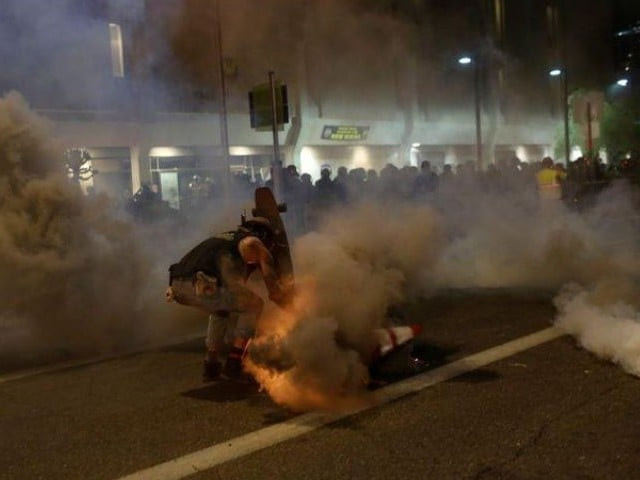I can’t breathe
The US has only become more strident in its discriminatory attitude against blacks

A protester shields himself from tear gas with his skateboard while demonstrating against the death in Minneapolis police custody of African-American man George Floyd, and of Dion Johnson, who was killed in Arizona, outside of Phoenix police headquarters in Phoenix, Arizona, US. PHOTO: REUTERS
Floyd’s murder was borne of hate and blackophobia bred in US law enforcers, especially the police. The protests are not against police brutality but against the brutality of the police towards Black Americans. The demonstrations are not to put in perspective the police’s hard handiness but to give context to the lives of the Black Americans, taken lying down for centuries. If earlier the slogan was “Black lives matter”, it is now “I can’t breathe”. Suffocation has anyway been a way of life for Black Americans. The knee that pressed against Floyd’s neck has metaphorically been upon the Black Americans’ for centuries.
During the slavery and legal segregation era, the profit-oriented whites would threaten black families without qualms. Joe Feagin, in his book, Systemic Racism: A Theory of Oppression, writes: “Extreme family disruption and destruction were routinely inflicted on black families as part of whites’ quest for financial gains, sexual exploitation, and social control. In the contemporary era, the whites of any strand would rarely engage overtly in any skirmish with blacks to oppress them directly. Rather they allow and encourage white police officers to engage in brutality and other coercive mistreatment of the African American.”
Targeting blacks with hate crime represents only the tip of the racism iceberg. Blacks have difficulty finding skilled jobs. They make on average much less than white workers and are discriminated during the hiring process. In the recent corona pandemic followed by economic recession, blacks were not only the highest category of people to have died due to Covid-19, but also one of the hardest hit economically. According to the Centres for Disease Control and Prevention study, Black Americans make up 12.5% of the US population but account for 22.4% of Covid-19 deaths. The unemployment rate among blacks is 16.7%, compared with a white unemployment rate of 14.2%.
The reasons behind these differentials are persistent health and economic disparities. The survey indicates that one in five black people in the US live below the poverty line. In 2018, the median household income for white households was 70% higher than for black households ($70,642 vs $41,692).
In his book, Lost Rights: The Destruction of American Liberty, James Bovard, writes that 72% of the Fortune 500 Companies relied on some form of quota hiring system. He quoted the Equal Employment Opportunity Commission Chairman, Even Kemp, saying: “During the private debate of Civil Rights Act of 1991, so-called civil rights leaders went so far as to plead with the White House for one more generation of quota for blacks, and yet publicly they proclaimed this is not a quota bill.”
The US has only become more strident in its discriminatory attitude against blacks. Legally things may have improved, but no serious effort has been made to alter the mindset that feeds on cognitive notions and stereotypes of racism such as the danger of the black man, the lazy black person, the black woman’s fondness for welfare and the inferiority and incompetence.
Former US president, George Bush, said in a statement that he “is anguished by the brutal suffocation of George Floyd and disturbed by the injustice and fear that suffocate our country.” He further said, “It is time for America to examine our tragic failure… black people see the repeated violation of their rights without an urgent and adequate response from American institutions.”
The swamp of racism has deepened since Trump’s presidential slogan of white supremacy and with nationalism becoming a regular jargon after 9/11. The irony is that the US has been lashing out at the international community for human rights violations, often taking extreme steps of suspending economic aid and partnering with the minorities in the so-called rouge countries to bring down their governments. It is time for the US to take a trip down its history of hate-crime and discrimination towards its minorities.
Published in The Express Tribune, June 4th, 2020.
Like Opinion & Editorial on Facebook, follow @ETOpEd on Twitter to receive all updates on all our daily pieces.













COMMENTS
Comments are moderated and generally will be posted if they are on-topic and not abusive.
For more information, please see our Comments FAQ